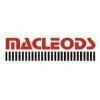Junior Research Associate
20+ Junior Research Associate Interview Questions and Answers

Asked in Aragen Life Sciences

Q. What is the role of MCPBA, including the complete mechanism?
MCPBA is a powerful oxidizing agent used in organic chemistry reactions.
MCPBA stands for meta-chloroperoxybenzoic acid.
It is commonly used to convert alkenes into epoxides.
The mechanism involves the transfer of an oxygen atom from MCPBA to the double bond of the alkene, forming an epoxide.
MCPBA can also oxidize sulfides to sulfoxides and sulfones.
It is a versatile reagent in various oxidation reactions.

Asked in Aragen Life Sciences

Q. Explain the mechanism of the Beckmann rearrangement.
Beckmann rearrangement is a chemical reaction that involves the conversion of an oxime to an amide.
The reaction is carried out in the presence of a strong acid catalyst, such as sulfuric acid or hydrochloric acid.
The oxime is first protonated by the acid catalyst, which then undergoes rearrangement to form an isocyanate intermediate.
The isocyanate intermediate then reacts with water to form the desired amide product.
The reaction is widely used in the synthesis of various amid...read more
Junior Research Associate Interview Questions and Answers for Freshers

Asked in Ipca Laboratories

Q. Which compound is a disadvantage of organic chemistry?
There is no disadvantage of organic chemistry, only challenges to overcome.
Organic chemistry is essential for the development of new drugs and materials.
It can be challenging to synthesize complex organic molecules.
Organic compounds can be volatile and hazardous to work with.
However, proper safety measures can mitigate these risks.
Overall, organic chemistry is a valuable and necessary field of study.

Asked in Gland Pharma

Q. What are genotoxic impurities, and how can we control them in the process?
Genotoxic impurities are substances that have the potential to cause DNA damage and mutations.
Genotoxic impurities can be present in raw materials, intermediates, or final products.
They can be controlled by implementing appropriate measures such as using high-quality raw materials, optimizing the manufacturing process, and conducting thorough testing.
Examples of genotoxic impurities include nitrosamines, polycyclic aromatic hydrocarbons, and heavy metals.
Regulatory agencies s...read more
Asked in Clians Labs

Q. What is the difference between the limit of detection (LOD) and the limit of quantitation (LOQ)?
LOD is the lowest concentration of an analyte that can be reliably detected, while LOQ is the lowest concentration that can be quantified accurately.
LOD is the lowest concentration of an analyte that can be reliably detected, but not necessarily quantified.
LOQ is the lowest concentration of an analyte that can be quantified accurately with a defined degree of precision and accuracy.
LOQ is typically higher than LOD, as it requires a higher level of confidence in the measuremen...read more

Asked in Virchow Biotech

Q. What is SDS-PAGE and how is it used in biological research?
SDS-PAGE is a technique for separating proteins based on their size using a polyacrylamide gel and sodium dodecyl sulfate.
Separation by Size: SDS-PAGE separates proteins primarily based on their molecular weight, allowing researchers to analyze protein purity and size.
Denaturation: SDS (sodium dodecyl sulfate) denatures proteins, giving them a negative charge proportional to their length, ensuring uniform migration in the gel.
Visualization: After electrophoresis, proteins can...read more
Junior Research Associate Jobs




Asked in Visible Alpha Solutions

Q. What is revenue drivers and related to it
Revenue drivers are factors that contribute to the growth of a company's revenue.
Revenue drivers can be internal or external factors
Examples of internal revenue drivers include product innovation, pricing strategy, and marketing efforts
Examples of external revenue drivers include changes in market demand, economic conditions, and competition
Identifying and focusing on revenue drivers can help a company increase its revenue and profitability

Asked in Visible Alpha Solutions

Q. Intenlinkege between financial statements
The financial statements are interconnected and provide a comprehensive view of a company's financial performance.
The income statement shows the company's revenues, expenses, and net income or loss for a specific period.
The balance sheet presents the company's assets, liabilities, and shareholders' equity at a specific point in time.
The cash flow statement reports the company's cash inflows and outflows from operating, investing, and financing activities.
The financial stateme...read more
Share interview questions and help millions of jobseekers 🌟


Asked in Virchow Biotech

Q. What is High-Performance Liquid Chromatography (HPLC)?
High-Performance Liquid Chromatography (HPLC) is a technique for separating, identifying, and quantifying compounds in a mixture.
Separation Technique: HPLC separates components based on their interactions with a stationary phase and a mobile phase.
Applications: Commonly used in pharmaceuticals for drug analysis, in environmental testing for pollutants, and in food industry for quality control.
Types of HPLC: Includes normal phase, reverse phase, ion-exchange, and size-exclusio...read more

Asked in Aragen Life Sciences

Q. Suzuki coupling with mechanism ...
Suzuki coupling is a palladium-catalyzed cross-coupling reaction between organoboron compounds and organic halides.
The reaction involves the oxidative addition of the organic halide to the palladium catalyst, followed by transmetalation with the organoboron compound.
The resulting intermediate undergoes reductive elimination to form the coupled product.
Suzuki coupling is widely used in organic synthesis to form carbon-carbon bonds.
For example, it can be used to synthesize biar...read more
Asked in Revita Life Sciences

Q. What knowledge do you have in stem cells?
Stem cells are undifferentiated cells with the potential to develop into various cell types, crucial for regenerative medicine.
Stem cells can be classified into two main types: embryonic stem cells (ESCs) and adult stem cells (ASCs).
ESCs are pluripotent, meaning they can differentiate into any cell type in the body, while ASCs are multipotent, limited to specific lineages.
Examples of adult stem cells include hematopoietic stem cells, which give rise to blood cells, and mesenc...read more

Asked in Ipca Laboratories

Q. What is the m/z ratio?
m/z ratio is the mass-to-charge ratio of an ion in mass spectrometry.
m/z ratio is used to identify and quantify molecules in a sample.
It is calculated by dividing the mass of an ion by its charge.
The resulting value is used to plot the mass spectrum of a sample.
For example, a molecule with a mass of 100 Da and a charge of +1 would have an m/z ratio of 100.
Different molecules can have the same m/z ratio, so additional techniques are used to identify them.

Asked in TCS

Q. What is your expected CTC?
Expected CTC and relocation adjustments are negotiable based on company policies and mutual agreement.
Expected CTC can be discussed based on the job role, experience, and industry standards.
Relocation adjustments can be negotiated based on the distance, cost of living, and company policies.
Mutual agreement between the employer and employee is important for a smooth relocation process.
Examples of relocation adjustments include temporary accommodation, transportation, and reloc...read more
Asked in Clians Labs

Q. What are validation parameters?
Validation parameters are criteria used to assess the accuracy, reliability, and consistency of data or processes.
Validation parameters include accuracy, precision, specificity, sensitivity, linearity, range, and robustness.
They are used to ensure that data or processes meet predefined standards or requirements.
For example, in analytical chemistry, validation parameters are used to assess the performance of analytical methods.
Validation parameters may vary depending on the sp...read more

Asked in Macleods Pharmaceuticals

Q. What about HPLC method development
HPLC method development involves optimizing the conditions for separation and detection of analytes in a sample using high-performance liquid chromatography.
Selecting appropriate stationary and mobile phases
Optimizing flow rate and gradient conditions
Validating the method for accuracy and precision
Troubleshooting and optimizing as needed
Examples: developing a method for quantifying a drug in a biological sample, optimizing separation of complex mixtures for analysis
Asked in Navin Saxena Research And Technology

Q. What are the NMR values of aldehydes and aromatic compounds?
Aldehydes show a distinct NMR signal due to their carbonyl group, while aromatic compounds exhibit unique shifts from their ring structure.
Aldehyde Proton NMR Shift: Aldehyde protons (–CHO) typically appear around 9-10 ppm due to the deshielding effect of the carbonyl group.
Aromatic Proton NMR Shift: Protons on aromatic rings usually resonate between 6-8 ppm, influenced by the electron density of the ring.
Example of Aldehyde: Benzaldehyde shows a singlet around 9.2 ppm for it...read more
Asked in Navin Saxena Research And Technology

Q. Tell me about column chromatography.
Column chromatography is a technique for separating mixtures based on differential adsorption to a stationary phase.
Separation Principle: It relies on the differential affinity of compounds for the stationary phase and the mobile phase.
Stationary Phase: Common materials include silica gel or alumina, which interact differently with various compounds.
Mobile Phase: A solvent or mixture of solvents that carries the sample through the column, affecting separation efficiency.
Appli...read more

Asked in CARS24

Q. What is Deferred tax?
Deferred tax is a liability or asset that arises due to temporary differences between accounting and tax rules.
Deferred tax is recorded on the balance sheet as a liability or asset.
It is caused by differences in the recognition of revenue, expenses, or assets between accounting and tax rules.
Deferred tax liabilities arise when taxable income is lower than accounting income, resulting in higher taxes in the future.
Deferred tax assets arise when taxable income is higher than ac...read more

Asked in Hetero Biopharma

Q. How do you pack a column?
Column packing is a process of filling a chromatography column with a stationary phase.
Choose an appropriate stationary phase based on the separation requirements.
Prepare the column by cleaning and conditioning it.
Pack the column by carefully adding the stationary phase.
Ensure proper packing density and uniformity.
Test the packed column for efficiency and performance.

Asked in Macleods Pharmaceuticals

Q. What about dissolution
Dissolution refers to the process of dissolving a solid substance in a liquid to form a homogeneous solution.
It is an important parameter in drug development and quality control
It determines the rate and extent of drug absorption in the body
Factors affecting dissolution include particle size, solubility, pH, and temperature
Dissolution testing is performed using various apparatus such as USP apparatus 1, 2, 3, and 4
Examples of drugs with poor dissolution include carbamazepine ...read more

Asked in Suminter India Organics

Q. What is method validation?
Method validation is the process of demonstrating that an analytical method is suitable for its intended purpose.
Method validation involves evaluating the performance characteristics of an analytical method, such as accuracy, precision, specificity, and sensitivity.
It ensures that the method is reliable and provides accurate results for the intended application.
Validation parameters may include linearity, range, limit of detection, limit of quantitation, and robustness.
Valida...read more
Asked in CSIR-CSIO

Q. Area of Expertise
My area of expertise is in molecular biology, specifically in gene expression regulation and protein interactions.
Extensive experience in conducting molecular biology experiments
Proficient in techniques such as PCR, Western blotting, and RNA sequencing
Skilled in analyzing gene expression data and identifying regulatory mechanisms
Knowledgeable in protein-protein interactions and signaling pathways

Asked in Hetero Biopharma

Q. Column chromatography means
Column chromatography is a technique used to separate and purify components of a mixture based on their different affinities for a stationary phase and a mobile phase.
Column chromatography involves passing a mixture through a column packed with a stationary phase, such as silica gel or alumina.
The components of the mixture interact differently with the stationary phase, leading to their separation.
The mobile phase, typically a solvent, carries the components through the colum...read more
Interview Questions of Similar Designations
Interview Experiences of Popular Companies






Calculate your in-hand salary
Confused about how your in-hand salary is calculated? Enter your annual salary (CTC) and get your in-hand salary


Reviews
Interviews
Salaries
Users










